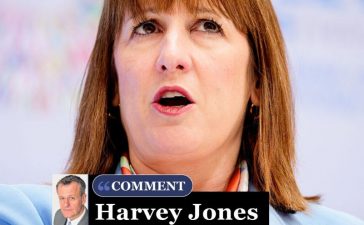Moody’s cuts outlook on U.S. banking system to negative
Ratings agency Moody’s has changed its outlook on the US banking system to “negative” from “stable” after the collapse of three major banks fueled fears of a contagion.
Moody’s Investors Service said it was making the move in light of three key bank failures in recent days that prompted regulators to step in on Sunday with a dramatic rescue plan for depositors and other institutions impacted by the crisis.
In a report, Moody’s says that the operating environment for US banks is “rapidly deteriorating”.
“We have changed to negative from stable our outlook on the US banking system to reflect the rapid deterioration in the operating environment following deposit runs at Silicon Valley Bank (SVB), Silvergate Bank, and Signature Bank (SNY) and the failures of SVB and SNY.”
Moody’s cuts outlook on US banking system to negative, citing ‘rapidly deteriorating operating environment’.
Stock markets unfazed: still up 2%-3%.
— Euan Rellie (@euanrellie) March 14, 2023
As covered this morning, Moody’s also put six US regional banks on watch for a potential downgrade.
Key events
Closing post
Time to wrap up….
In a note published overnight, it says
Although the Department of the Treasury, Federal Reserve and FDIC announced that all depositors of SVB and Signature Bank will be made whole, the rapid and substantial decline in bank depositor and investor confidence precipitating this action starkly highlight risks in US banks’ asset-liability management (ALM) exacerbated by rapidly rising interest rates.
Financial stocks have rallied in New York, and also in London, with US regional bank shares surging today, after heavy losses on Monday. There were losses in Asia, though, where Japanese banks fell in overnight trading.
Susannah Streeter, head of money and markets at Hargreaves Lansdown, sums up the situation:
‘’US banking stocks are on a rollercoaster ride, rising sharply following the steep sell offs yesterday as worries seem to be lifting a little about contagion from the SVB collapse.
Hope is rebounding that the backstop of deposits of failed banks will stem further withdrawals and that more generous loan terms to struggling banks could help restore confidence. First Republic Bank shares have surged 44% but still haven’t made up the punishing losses of recent days, indicating that uncertainty remains about its robustness.
The FTSE 100 has been swept upwards in afternoon trade, helped by the tailwinds from Wall Street.
The Justice Department and the Securities and Exchange Commission are investigating the collapse of Silicon Valley Bank, the Wall Street Journal is reporting.
In the UK, MPs on the Treasury Committee are to hold a hearing into the rescue of Silicon Valley Bank UK.
German chancellor Olaf Scholz tried to reassure his citizens about the crisis, saying that Germans should not have major concerns about the fallout of Silicon Valley Bank’s collapse.
The markets rallied after US inflation fell to 6%, raising hopes that the US Federal Reserve will not feel compelled to implement a large interest rate hike this month.
Here are the rest of today’s main stories:
FTSE 100 closes 1.1% higher
With the mood in the City rather brighter today than yesterday, the FTSE 100 index has closed 88.5 points higher tonight.
The index of blue-chip shares gained 1.17% to close at 7637, recovering almost half of Monday’s losses.
Rolls-Royce (+7%), Ocado (+4.1%) and Hargreaves Lansdown (+4%) led the risers.
UK listed banks also rallied, with Barclays up 3.1% and Lloyds Banking Group gaining 2.1%.
Charles Archer of IG, warns though, that the Silicon Valley Bank crisis is “far from over”.
Across the pond, the Financial Times has reported that larger institutions such as Citi and JPMorgan are being inundated with new depositors fleeing from the thousands of smaller US banks.
For context, it’s worth remembering that while US regulators have guaranteed the deposits of funds held at Silicon Valley Bank and Signature Bank, this protection has not been extended universally.
This leaves depositors elsewhere relying on the FDIC insurance, limited to just $250,000, akin to the £85,000 FSCS limit in the UK. Over 30% of US deposits are held in small banks in the states, and more than 50% of funds are above the FDIC limit.
With new CPI figures showing that annual inflation has slowed to 6%, Federal Reserve Chair Jerome Powell has an unappetising tightrope to walk this month: pausing or pivoting could see inflation become more entrenched or start to rise just as it looked like it might finally get under control, while continuing to increase rates could well see another unexpected economic ‘break.’
With an hour’s trading to go here in London, the FTSE 100 index is up over 1%.
The blue-chip index has gained 89 points, back to 7638, gaining back almost half of Monday’s selloff.
Engineering company Rolls-Royce are the top riser, up 7%, followed by bank Barclays (+3.7%).
WSJ; Justice Department and SEC Investigating Silicon Valley Bank’s Collapse
The Justice Department and the Securities and Exchange Commission are investigating the collapse of Silicon Valley Bank, the Wall Street Journal is reporting.
The WSJ says:
The separate probes are in their preliminary phases and may not lead to charges or allegations of wrongdoing. Prosecutors and regulators often open investigations after financial institutions or public companies suffer big, unexpected losses.
*SVB FAILURE, EXECUTIVE TRADING INVESTIGATED BY DOJ AND SEC
— IG (@IGcom) March 14, 2023
The SEC and a spokesperson for the Justice Department in Washington have declined to comment.
This comes day after SVB Financial Group and two top executives were sued by shareholders, who accused them of concealing how rising interest rates would leave its Silicon Valley Bank unit susceptible to a bank run.
The proposed class action lawsuit against SVB, Chief Executive Greg Becker and Chief Financial Officer Daniel Beck was filed in the federal court in San Jose, California.
Full story: US inflation slows to 6% annual rate amid looming banking crisis

Lauren Aratani
Price rises slowed again in February as the annual rate of inflation eased but the report has been overshadowed by a banking crisis ahead of next week’s meeting of the Federal Reserve.
Prices in February were 6% higher than a year ago, down from an annual rate of 6.4% in January and significantly lower than the 9.1% peak of inflation seen in June, my colleague Lauren Aratani reports.
Between January and February, prices rose 0.4% as prices increased in sectors including housing and food.
While February saw the continuation of a downward trend in the 12-month inflation rate, the core prices – which excludes volatile food and energy prices – increased by 0.5% in February compared with a 0.4% monthly gain in January.
More here.
Moody’s cuts outlook on U.S. banking system to negative
Ratings agency Moody’s has changed its outlook on the US banking system to “negative” from “stable” after the collapse of three major banks fueled fears of a contagion.
Moody’s Investors Service said it was making the move in light of three key bank failures in recent days that prompted regulators to step in on Sunday with a dramatic rescue plan for depositors and other institutions impacted by the crisis.
In a report, Moody’s says that the operating environment for US banks is “rapidly deteriorating”.
“We have changed to negative from stable our outlook on the US banking system to reflect the rapid deterioration in the operating environment following deposit runs at Silicon Valley Bank (SVB), Silvergate Bank, and Signature Bank (SNY) and the failures of SVB and SNY.”
Moody’s cuts outlook on US banking system to negative, citing ‘rapidly deteriorating operating environment’.
Stock markets unfazed: still up 2%-3%.
— Euan Rellie (@euanrellie) March 14, 2023
As covered this morning, Moody’s also put six US regional banks on watch for a potential downgrade.
US president Joe Biden has welcomed the fall in inflation last month, saying:
Today’s report shows annual inflation is down by a third from this summer at a time when the unemployment rate remains near a 50-year low.
That is the slowest annual increase since September 2021. I will continue working to lower costs for hard-working Americans so they have a little more breathing room at the end of the month.
Investors are circling Silicon Valley Bank’s assets, after the bank was seized by federal regulators last week.
Bloomberg reports that Apollo Global Management Inc., Blackstone Inc. and KKR & Co. have expressed interest in snapping up a book of loans held by SVB.
It says:
Apollo, Blackstone and KKR, three of the world’s largest alternative asset managers, are among investors looking to buy pieces of Silicon Valley Bank, according to the people, who asked not to be identified discussing confidential information.
The bank had $73.6 billion of loans as of 31 December 2022. The size of the loan book Apollo and Blackstone are interested in couldn’t immediately be determined.
Blackstone is also looking at other assets it may purchase from the bank, one of the people said.
Apollo Global Management and Blackstone have expressed interest in snapping up a book of loans held by Silicon Valley Bank, the California lender seized by federal regulators last week, people with knowledge of the matter said. https://t.co/nEiGdujudc
— BNN Bloomberg (@BNNBloomberg) March 14, 2023
An index of US regional banks is rallying sharply today.
The SPDR S&P Regional Banking ETF is up over 7%, lifted by banks such as First Republic (+53%).
#Bank stocks rebounded after getting pummeled during Monday’s trading session. The SPDR S&P Regional Banking ETF rose more than 8% in premarket trading. Shares of First Republic Bank
popped nearly 60% in extended trading after closing down nearly 62% on Monday. KeyCorp
stock +13% pic.twitter.com/q1qAuzKWxl— Anish Nanda (@anish_nanda) March 14, 2023
Back in the UK, MPs are to hold a hearing on the collapse of Silicon Valley Bank later this month.
The Treasury committee will quiz the Bank of England on Tuesday 28 March, and examine ask why SVB UK had to be rescued by HSBC on Monday morning.
The committee has also written to the BoE, asking for details about how SVB UK was supervised before its collapse – including the resource allocated to it, the decision to choose HSBC as a purchases, and what lessons can be learned.
Harriett Baldwin MP, Chair of the Treasury Committee, says:
“This deal is the best possible outcome achieved in incredibly challenging circumstances. We thank everyone who worked tirelessly to achieve this deal.
“Yet, while it’s reassuring that taxpayer funds were not required in this instance, a number of questions remain around the effectiveness of bank regulation and resolution procedures, especially for smaller banks with a significant presence in strategically-important industries. It is important that we reflect on the lessons from this episode to ensure that the post-financial crisis regime to avoid bailouts remains strong.”
Meta shares jumps 6% as more job cuts announced
Shares in Facebooks owner, Meta, have jumped almost 6% after it announced plans to lay off another 10,000 workers.
This is the second round of significant job cuts announced by the tech giant in four months. It is also instituting a further hiring freeze as part of the company’s “Year of Efficiency”.
In a Facebook post today, CEO Mark Zuckerberg said the job cuts will take place “over the next couple of months.”
Zuckerberg wrote:
“We expect to announce restructurings and layoffs in our tech groups in late April, and then our business groups in late May,”
In a “small number of cases”, it may take through the end of the year to complete these changes, Zuckerberg says, adding:
“Overall, we expect to reduce our team size by around 10,000 people and to close around 5,000 additional open roles that we haven’t yet hired.”
Here’s the story:
Meta’s shares have jumped 5.5%, or $10, to $191, the highest in over a month.
Scholz plays down threat of SVB meltdown to Germany
German chancellor Olaf Scholz has said today that Germans should not have major concerns about the fallout of Silicon Valley Bank’s collapse.
Scholz said regulators had learned lessons from the global financial crisis in 2008, speaking in Berlin aongside Ilham Aliyev, the President of Azerbaijan.
The tech-focused Nasdaq index has jumped 2% in early trading, as the Wall Street rally gathers pace.
⚠️ U.S. STOCKS EXTEND GAINS, NASDAQ UP 2.01 PCT
— PiQ (@PriapusIQ) March 14, 2023
US stock market opens higher, as regional banks surge
The US stock market has jumped at the start of trading, as bank stocks mounted a comeback from Monday’s heavy losses.
The Dow Jones industrial average has gained 1%, up 314 points at 32,133 in a flurry of buying.
The broader S&P 500 index has gained 1.5%, as investors cheer the slowdown in US inflation last month.
DOW JONES UP 325.68 POINTS, OR 1.02 %, AT 32,144.82 AFTER MARKET OPEN
S&P 500 UP 52.14 POINTS, OR 1.35 PERCENT, AT 3,907.90 AFTER MARKET OPEN
NASDAQ UP 174.47 POINTS, OR 1.56 PERCENT, AT 11,363.32 AFTER MARKET OPEN
— First Squawk (@FirstSquawk) March 14, 2023
And after a brutal day yesterday, US regional banks are bouncing back in early trading, as concerns over their financial health ease.
San Francisco-based First Republic’s shares have surged 57%, back to $49.28. On Monday it fell 62%, from $81 to $31.
Western Alliance Bancorp, of Phoenix, Arizona has gained 52%, while Los Angeles-based PacWest has jumped 55%.
Zions, of Salt Lake City, Utah, has gained 22%.
Hard-hit regional bank stocks surged as no further FDIC takeovers were reported overnight or today, indicating things may be stabilizing:
– First Republic Bank $FRC +60%
– PacWest Bancorp $PACW +64%
– Western Alliance Bancorporation $WAL +52%— Streetinsider.com (@Street_Insider) March 14, 2023
However, Ronald Temple, chief market strategist at Lazard, argues that US interest rates will actually rise higher than forecast:
“This is exactly the inflation print the Fed did not want. The elevated core inflation in February adds to the evidence of economic strength from last week’s job numbers, signalling the need for tighter monetary policy.
But asset liability management challenges for some banks might limit the latitude to tighten in the near term. Despite banking challenges, persistent inflation means markets are likely wrong to expect rate cuts this year.
The economy remains strong, and the Fed will likely need to hike rates further and keep them higher for longer than markets are currently pricing.”
UK bank stocks rise
Bank shares in London have turned higher too.
Barclays are up 4.6% and Lloyds Banking Group have jumped 3%, among the top risers on the FTSE 100 today.
Overall US CPI moved down to 6.0% in February, the 8th consecutive decline in the YoY rate of inflation and the lowest level since September 2021.
US Core CPI (ex-Food/Energy) moved down to 5.5%, the 5th consecutive decline in the YoY rate & the lowest level since November 2021. pic.twitter.com/rihy5T7lu3
— Unistock Capital (@Unistockcapital) March 14, 2023
FTSE 100 pushes higher
European stock markets are now rallying, as investors are cheered by the fall in US inflation last month.
The UK’s FTSE 100 index has gained 42 points, or over 0.5%, to 7590 points, having been broadly flat before the inflation report hit the wires.
That recovers about a fifth of Monday’s selloff.
Germany’s DAX has gained 1.6%, while France’s CAC is 1.4% higher.
This suggests that the slowdown in price rises across America last month bolsters expectations of a smaller interest rate rise this month, of 25 basis points.






